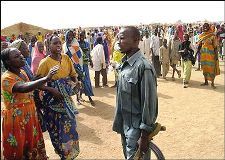Frustration, anger rising on all sides in Darfur crisis
By RAWYA RAGEH, Associated Press Writer
GENEINA, Sudan, Sep 18, 2004 (AP) — A clearly annoyed Sudanese general, asked about accusations his Arab-dominated government orchestrated a scorched earth policy against Africans of Darfur, responded with a question of his own.
 “Do you believe that any government in the world can attack its villagers and its people?” said Gen. Abdullah Suleiman Adam, the governor of West Darfur, as he sat in a rundown airport lounge.
“Do you believe that any government in the world can attack its villagers and its people?” said Gen. Abdullah Suleiman Adam, the governor of West Darfur, as he sat in a rundown airport lounge.
While officials like Adam complain they are being unfairly vilified, international human rights groups, the U.S. government, the European Union and the people of Darfur are becoming increasingly impatient with what they see as Sudan’s strategy of denial and delay.
That impatience was underscored Friday when angry people at Mornei camp, southeast of the West Darfur capital, Geneina, assaulted with sticks a government humanitarian official who tried to prevent them from complaining about their government to a U.S. aid delegation.
“I think it’s more than mistrust, it’s simmering rage,” said Andrew S. Natsios, head of the United States Agency for International Development, leader of the U.S. delegation. “They believe the government is trying to wipe them out.”
The U.N. Security Council was expected to vote later Saturday on a resolution to pressure Sudan to end the 19-month conflict.
The latest draft, which diplomats at U.N. headquarters in New York said appeared likely to pass, threatens sanctions if the Khartoum government fails to rein in militias ravaging western Darfur. It also calls for an international commission to investigate alleged human rights violations and whether acts of genocide occurred.
International attention, particularly U.S. pressure, has put the Sudanese government on the defensive.
One Sudanese official was blunt enough Friday to acuse Natsios of being biased in his assessment of the situation by laying the blame on the Janjaweed Arab militia alone.
“I think the problem is Natsios, ‘You are biased’,” Osman Kebir, governor of North Darfur, said at a meeting late Friday in the regional capital of al-Fasher after Natsios expressed concern regarding continued Janjaweed attacks.
Kebir also accused the United Nations, aid organizations and journalists of being biased.
“You relate all the burning to the Janjaweed but you don’t know who burned it. It was the opposition,” he said in the presence of two visiting U.S. congressmen, Arizona Republican Jim Kolbe and Illinois Democrat Jesse Jackson Jr.
The conflict in Darfur began when rebels with their base among the region’s ethnic African farmers rose up, accusing the Arab-dominated government in Khartoum of neglect and discrimination.
The government is accused of trying to put down the rebellion by backing armed Arab herdsmen known as Janjaweed who long have competed with villagers over Darfur’s scarce resources. The escalating violence, which has forced thousands of ethnic Africans from their homes, has been described by the United States as genocide.
The World Health Organization has estimated 50,000 deaths from violence, disease or starvation in Darfur.
Sudanese officials say Khartoum is doing its best to protect the camps and improve living conditions. The government has sent 2,000 policemen to secure West Darfur state, said Suleiman, the Sudanese general.
But aid workers and camp residents complain that this is not enough to cover a region that is home to more than 500,000 displaced people. And the conditions in the camps remain miserable.
“The biggest problem here are the (government) soldiers. They have created a state of fear among the people because they are Janajweed themselves,” said Mohammed Abdel Reheem of Golo town, an anti-government rebel strongholds. “Different names, same people.”
Fellow townsman Abakr Mohammed pointed to a cut on his head saying it was the result of a beating by a Sudanese officer while he and a friend walked down the street.
“They just stopped us and said: ‘Can’t you see us coming?’ Then they started hitting us with their rifle butts,” he said, tears in his eyes.
Thuraya Bakr, 25, lifted her 21-month-old infant’s clothes to show a burn on the baby’s back resulting from what she said was the burning down of her house in an attack by soldiers.
But a group of policemen outside Mornei shook their head in disapproval at the accusations that they were aiding the Janjaweed.
“We are sent here to protect the camps from the Janjaweed, we are here for the people’s sake,” said Cpl. Wahid Othman. “We are against the Janjaweed ourselves.”
African Union monitors and aid workers alike have complained about the lack of assistance from the Sudanese authorities. Although Khartoum has said it changed local governors and officials as a measure of trust-building, the displaced have lost faith.
“We know them (the new officials), and some of them are not any better. They have worse histories in the south,” said Natsios, a reference to southern Sudan, where more than 2 million people died from fighting and civil war-related famine.
Kolbe and Jackson, the visiting members of the U.S. House of Representatives, were with Natsios at his meeting in al-Fasher with the Sudanese regional governor.
Kolbe told reporters they were in Darfur to see “progress with humanitarian assistance and additional assistance needed from the U.S. government and the rest of the world.”
